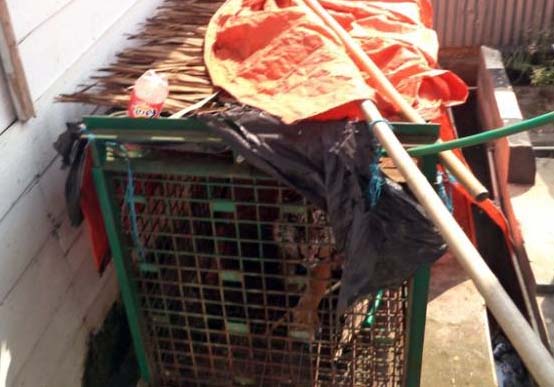
BENGKULU, KOMPAS.com - In one corner of the office of the Natural Resources Conservation Agency (BKSDA) Bengkulu (in the island of Sumatra, Indonesia), there are two Sumatran tigers named Elsa and Giring with alarming conditions.
Elsa, a six-year-old female tiger, has been rescued by BKSDA (Bengkulu) since April 2. She was trapped by a hunter. Because of snare her right foot was severely injured causing four of her front right fingers lamputated.
The other tiger, Giring, is a seven-year-old male. Giring has been at the BKSDA Bengkulu office since February 26, 2015. He was catched for preying on human in a rubber plantation in Seluma district (Bengkulu).
Mrs. Erni Suryanti from the Conservation, Health, and Rescue Unit of BKSDA Bengkulu said, her unit had recommended Giring for realease back to the wild.
However, before he is returned to the wild, Ms. Erni suggests to make an adequate enclosure to keep his wild nature while Elsa can be used for breeding programme because of her disability.
"We only make recommendations after the condition of the tiger medically examined. In Sumatra there is no reintroduction programme for tiger (with disability). So, we are facing a difficulty," Erni told Kompas.com recently.
Erni added, the two tigers, particularly Giring, should be immediately released. Because, if they are too long in the cage and always interact with human, the two wild animals will loose their wild nature.
The other problem is that the BKSDA Bengkulu does not have representative and adequate facilities for retraining both tigers. "Since their arrests both still in (small) cages. Supposedly they were in enclosure that will allow them to maintain their wild nature. Unfortunately, such facility is not exist," Ernie added.
While they are in cages, the BKSDA feed them with 8 to 10 kilograms of pork once in every two days. "We choose pork because the price is cheaper than beef. Sometimes they fast for up to three days because of a limited budget to buy meat," said Ernie.
Budget constraints not only affect food intake for both tigers. There is also a constraint in providing medicine and laboratory examination. Sometimes, medicine needed can not be provied.
In the last few years up to 9 problematic tigers have been rescued for various reasons, i.e., hunting and human-tiger conflicts.

A Sumatran tiger in small cage. Photo: kompas.com